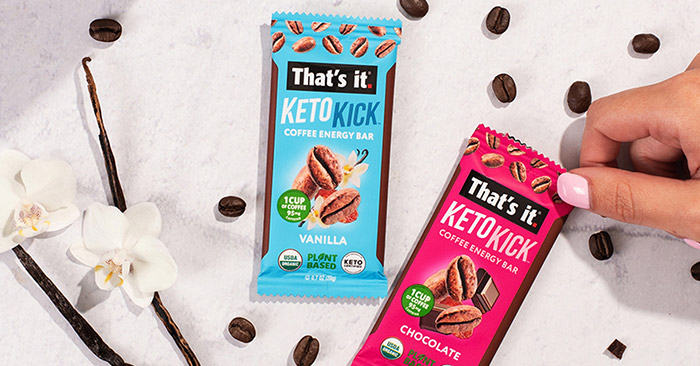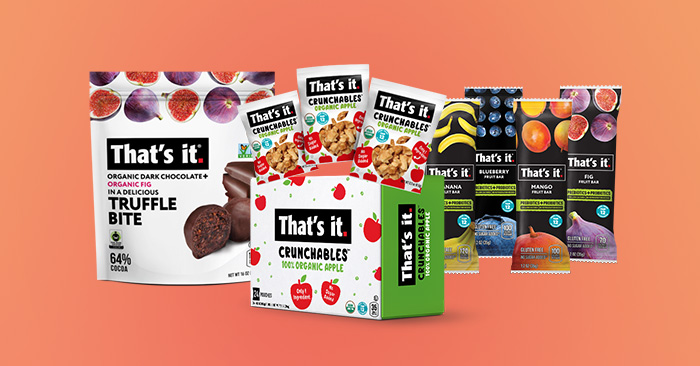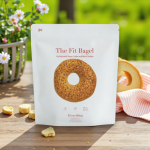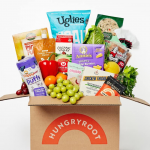With New Line, That’s It Hopes to Become “Plant-Based Snackable Platform”

With a slew of new product lines over the past few years, That’s It is working to prove that it’s more than just a fruit-based bar brand. As part of its goal to create a plant-based snacking platform across several categories, the brand this month debuted a new energy bar line called Keto Kick, which it hopes will further expand its reach to new consumers.
Launched in 2012, the company initially produced bars made only from fruit, hence the name “That’s It,” as the flavor name also served as the product’s ingredient list. The core line is now sold in retailers such as Target, Whole Foods, Costco and Walmart, with the latter retailer also selling a probiotic version of the bars. A chocolate fruit truffle product line followed in 2018.
Still, these launches largely stuck to the same base concept of a chewy fruit base, differentiated by added ingredients or form factors. But there seemed to be more opportunity, founder and CEO Dr. Lior Lewensztain, MD said, and That’s It wanted to evaluate where it could go next. Over the past 12 to 18 months, he said the brand “took a step back” to evaluate its product offerings and identify where the brand could add additional value.
“What we developed was a snackable platform that’s totally plant-based,” he said. “We wanted to recognize that there were a lot of different categories that could have an impact, especially being completely plant-based. And there were gaps in those categories that we wanted to bring the products to market with.”
The brand took a critical eye to existing lines earlier this year, revamping its truffles with new packaging and flavors. Next the company set out to disrupt fruit snacks with the debut of Crunchables: clusters of dried fruits offered in varieties aimed at both kids and adults.
Now, in hopes of attracting keto-conscious consumers, it’s moving beyond fruit entirely. That consumer, Lewensztain said, was previously a missed opportunity because of the natural sugars and carbohydrates in fruit. The new date-sweetened Keto Kick bars are offered in chocolate and vanilla flavors and contain 95 mg of caffeine from single-origin Ethiopian coffee beans. Sold in 24-packs for $29.99 the product launched on the brand’s site and Amazon. Lewensztain said the digital-first approach will give the company time to collect data and possibly iterate based on consumer feedback.
While the bar category took a hit during the pandemic as on-the-go consumer purchases declined, Lewensztain said the company was able to “weather the storm” and grow through additional product launches. The company also took on investment for an undisclosed amount in March 2020 from growth equity firm T-street Capital to support expansion opportunities, and has added new team members in marketing and sales to continue to drive brand awareness.
As the bar category begins to show “signs of coming back to normalcy” in retail, Lewensztain said, Keto Kick will help the brand stand out in a set that has remained increasingly crowded, despite the sales declines. The functional offering features a higher caffeine serving than other similar offerings like Clif’s Coffee Collection (which launched last year) while also avoiding the trappings of “dirty keto” with a shorter ingredient list free of sugar alcohols. Lewenztain said the immediacy of the bar’s functional benefits should also drive repeat purchases.
“That’s really exciting to us, being able to make that visceral connection for the consumer, and really them being able to feel what they’re consuming,” he said. “When you have a protein bar, you don’t really feel that you’re having 20 grams of protein, but this is a place where we can really bring that to the consumer.”

Though the brand’s portfolio now spreads across categories, functional benefits and consumer segments, Lewensztain said that he believes the company can balance different messages if it keeps to a throughline of “simplicity” and continues to only have minimal ingredients in its products.
That message has evolved from its initial focus on fruit, but Lewensztain said the company has found existing customers trust the brand and are willing to follow it into new categories.
“The idea here with our expansion of our plant-based platform is to be able to provide solutions for different categories and different ages,” he said. “We’ve really been able to create a lineup of products that spans all categories that allows us to really provide different solutions for different needs throughout the day.”
Looking ahead, Lewensztain said “the sky’s definitely the limit” for future launches, and the company already has new launches outside of the fruit bar space slated for earlier this year.
“We’re still an emerging brand, so we’re able to move very quickly and nimbly,” he said. “We want to take advantage of the fact that we had solutions that we could provide for those need states [and] for those gaps that really abide by our brand guidelines of keeping it very clean, very simple, minimal ingredients and really just driving health and wellness in general.”

















